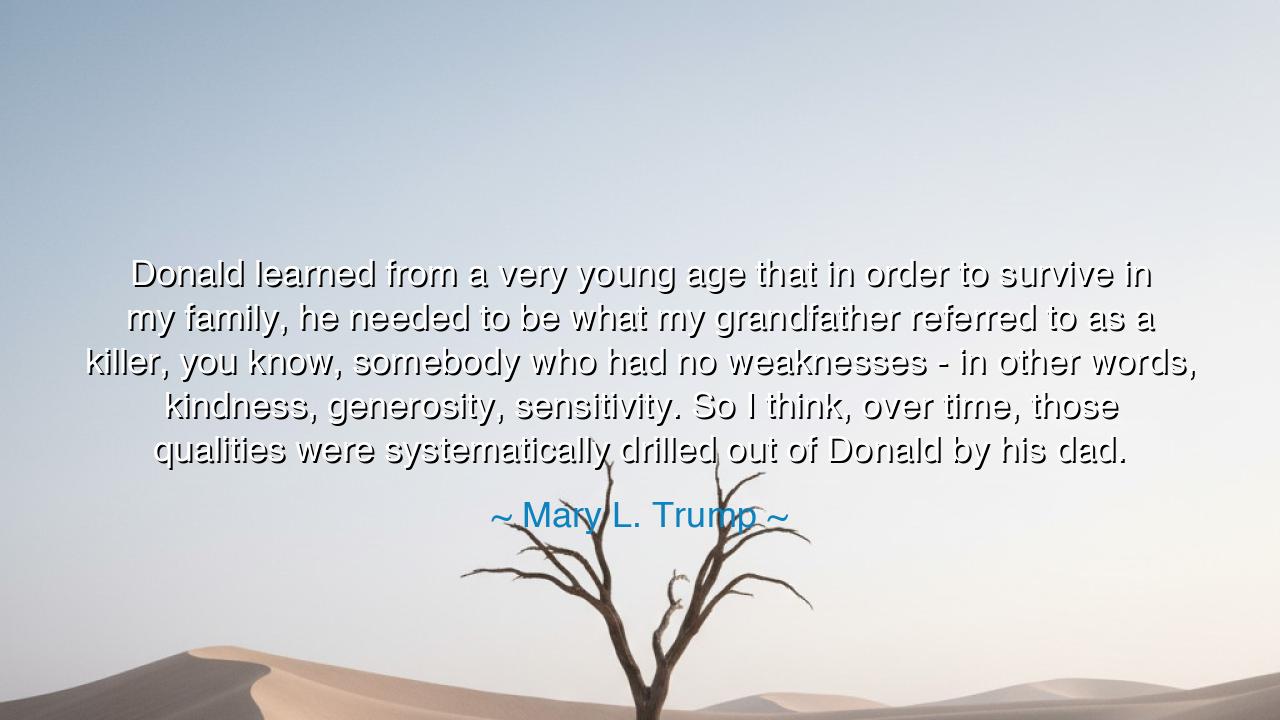
Donald learned from a very young age that in order to survive in
Donald learned from a very young age that in order to survive in my family, he needed to be what my grandfather referred to as a killer, you know, somebody who had no weaknesses - in other words, kindness, generosity, sensitivity. So I think, over time, those qualities were systematically drilled out of Donald by his dad.






In the great tapestry of life, each of us is shaped by the forces that surround us. We are molded, sometimes gently, sometimes harshly, by the hands of our ancestors and families. A child, born into this world, arrives pure and untested, a vessel of potential—but what fills this vessel depends upon the lessons taught by those who came before. And what lessons, what powers, are bestowed upon the young? Are they of love, of gentleness, of compassion? Or are they of strength, of survival, of ruthlessness?
It is in this light that we must examine the words of Mary L. Trump, when she reflects upon her uncle's upbringing. She speaks of Donald, who from a tender age was taught that in order to survive within the family, he had to embrace a dark mantle—he must become a "killer". In the eyes of his father, Fred Trump, there was no room for the softness of a heart, for the gentleness of a soul. In the crucible of this family, there was only one path to triumph: one must shed all that makes one vulnerable, all that might be perceived as weakness. Kindness, generosity, sensitivity—these were the qualities to be feared, to be discarded, lest they bring about one's ruin. And so, the essence of these qualities, which are the very foundation of what makes us human, was carefully and systematically drilled out of Donald by the hands of his father. The result was a man, fortified but hollow, a killer of hearts, a master of survival in a world that demands the ruthless pursuit of power.
What does this tell us about the nature of a soul? A man who has been shaped in this fashion is not unlike a sword forged in fire—strong, sharp, and unyielding. But a sword, though it may gleam with power, is also a tool for destruction. And like the sword, a man who has abandoned the very qualities that tie him to others—the compassion, the empathy, the vulnerability—becomes a tool of his environment, driven not by the compass of love, but by the blind march of self-preservation. The tragedy of this shaping is not just that the individual becomes a weapon, but that they lose the very thing that makes life worth living—the capacity to love.
History is filled with tales of those who have been similarly forged in the fires of ruthless ambition. Take the great Alexander the Great, a king who sought the world in his hands and subjugated kingdoms beneath his feet. Alexander, much like Donald, was raised in a world of toughness, where softness was seen as a flaw, a hindrance to the demands of empire-building. Yet, in the vastness of his empire, amidst his victories and riches, he was haunted by loneliness, a solitude that no power could banish. He had built the world, but in doing so, he had torn apart the very connections that made the world worth living in. His story echoes with the lament of those who, in their quest for dominance, lost the very thing they sought to protect.
The lesson here is as old as time: strength—true strength—is not in the ability to crush others, to dominate, to leave no room for weakness. True strength is in the ability to endure, to face the trials of life not with a heart of stone, but with a heart that remains open, vulnerable, and capable of love. For what is a life without love? What is a man without empathy? The true measure of a person lies not in their ability to conquer, but in their ability to connect.
As we ponder this ancient wisdom, let us ask ourselves: What are we teaching the generations that come after us? Are we raising children, are we shaping lives, with a vision that glorifies strength at the cost of kindness? Do we, like Fred Trump, demand that our loved ones shed their weaknesses to survive in a world that glorifies power? Or are we teaching them the strength that comes from vulnerability, from the courage to love even when it hurts, from the strength to be compassionate in a world that often demands otherwise?
We must choose the path of wisdom. Let us raise our children not to be killers, but to be healers. Let us show them that true strength is not the absence of weakness, but the integration of kindness and strength, vulnerability and resilience. Let us pass down the lesson that to survive and thrive in this world, we must learn not just to stand tall, but to stand together—in solidarity, in love, in compassion.
In the end, the true killer is not the one who conquers the world with a ruthless hand, but the one who conquers their own darkness with the light of love, and who passes that light on to others. And so, as we move forward, we must remember: the greatest strength lies in our ability to love, to be sensitive, to be generous, and to teach those who come after us to do the same.






AAdministratorAdministrator
Welcome, honored guests. Please leave a comment, we will respond soon